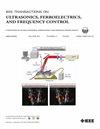利用飞行时间衍射和自注意神经网络进行超声波粗糙裂纹表征。
IF 3
2区 工程技术
Q1 ACOUSTICS
IEEE transactions on ultrasonics, ferroelectrics, and frequency control
Pub Date : 2024-09-12
DOI:10.1109/TUFFC.2024.3459619
引用次数: 0
摘要
飞行时间衍射(ToFD)是一种广泛使用的超声波无损评估方法,用于定位和表征粗糙缺陷,对光滑裂纹的尺寸测量精度很高。然而,自然生长的缺陷往往具有不规则的表面,使接收到的尖端衍射波复杂化,影响缺陷表征的准确性。本文提出了一种自注意深度学习方法来解释 ToFD A 扫描信号,以确定粗糙缺陷的大小。本文使用高保真有限元(FE)仿真软件 Pogo 生成合成数据集,用于训练和测试深度学习模型。此外,还利用迁移学习(TL)方法对高斯粗糙缺陷训练的深度学习模型进行微调,以提高表征真实热疲劳粗糙缺陷的性能。为了验证所开发的深度学习模型的性能,使用增材制造的二维粗糙裂纹样品进行了超声波实验。为了证明所提方法的准确性,将裂纹表征结果与传统的希尔伯特峰峰值大小法进行了比较。结果表明,与 ToFD 测量中使用的传统尺寸测量方法相比,深度学习方法显著降低了粗糙缺陷表征的不确定性和误差。本文章由计算机程序翻译,如有差异,请以英文原文为准。
Ultrasonic Rough Crack Characterization Using Time-of-Flight Diffraction With Self-Attention Neural Network
Time-of-flight diffraction (ToFD) is a widely used ultrasonic nondestructive evaluation (NDE) method for locating and characterizing rough defects, with high accuracy in sizing smooth cracks. However, naturally grown defects often have irregular surfaces, complicating the received tip diffraction waves and affecting the accuracy of defect characterization. This article proposes a self-attention (SA) deep learning method to interpret the ToFD A-scan signals for sizing rough defects. A high-fidelity finite-element (FE) simulation software Pogo is used to generate the synthetic datasets for training and testing the deep learning model. Besides, the transfer learning (TL) method is used to fine-tune the deep learning model trained by the Gaussian rough defects to boost the performance of characterizing realistic thermal fatigue rough defects. An ultrasonic experiment using 2-D rough crack samples made by additive manufacturing is conducted to validate the performance of the developed deep learning model. To demonstrate the accuracy of the proposed method, the crack characterization results are compared with those obtained using the conventional Hilbert peak-to-peak sizing method. The results indicate that the deep learning method achieves significantly reduced uncertainty and error in rough defect characterization, in comparison with traditional sizing approaches used in ToFD measurements.
求助全文
通过发布文献求助,成功后即可免费获取论文全文。
去求助
来源期刊
CiteScore
7.70
自引率
16.70%
发文量
583
审稿时长
4.5 months
期刊介绍:
IEEE Transactions on Ultrasonics, Ferroelectrics and Frequency Control includes the theory, technology, materials, and applications relating to: (1) the generation, transmission, and detection of ultrasonic waves and related phenomena; (2) medical ultrasound, including hyperthermia, bioeffects, tissue characterization and imaging; (3) ferroelectric, piezoelectric, and piezomagnetic materials, including crystals, polycrystalline solids, films, polymers, and composites; (4) frequency control, timing and time distribution, including crystal oscillators and other means of classical frequency control, and atomic, molecular and laser frequency control standards. Areas of interest range from fundamental studies to the design and/or applications of devices and systems.

 求助内容:
求助内容: 应助结果提醒方式:
应助结果提醒方式:


